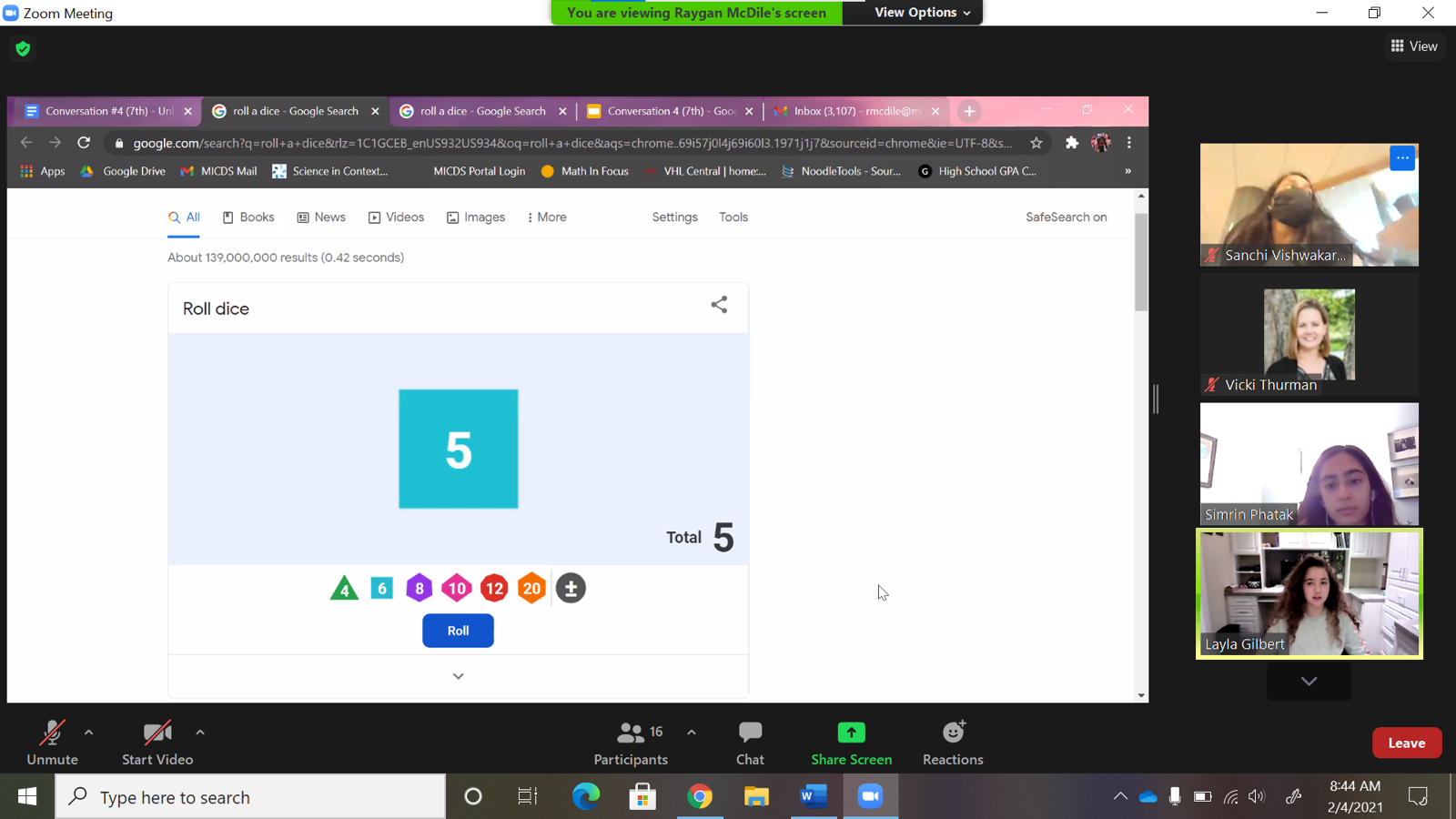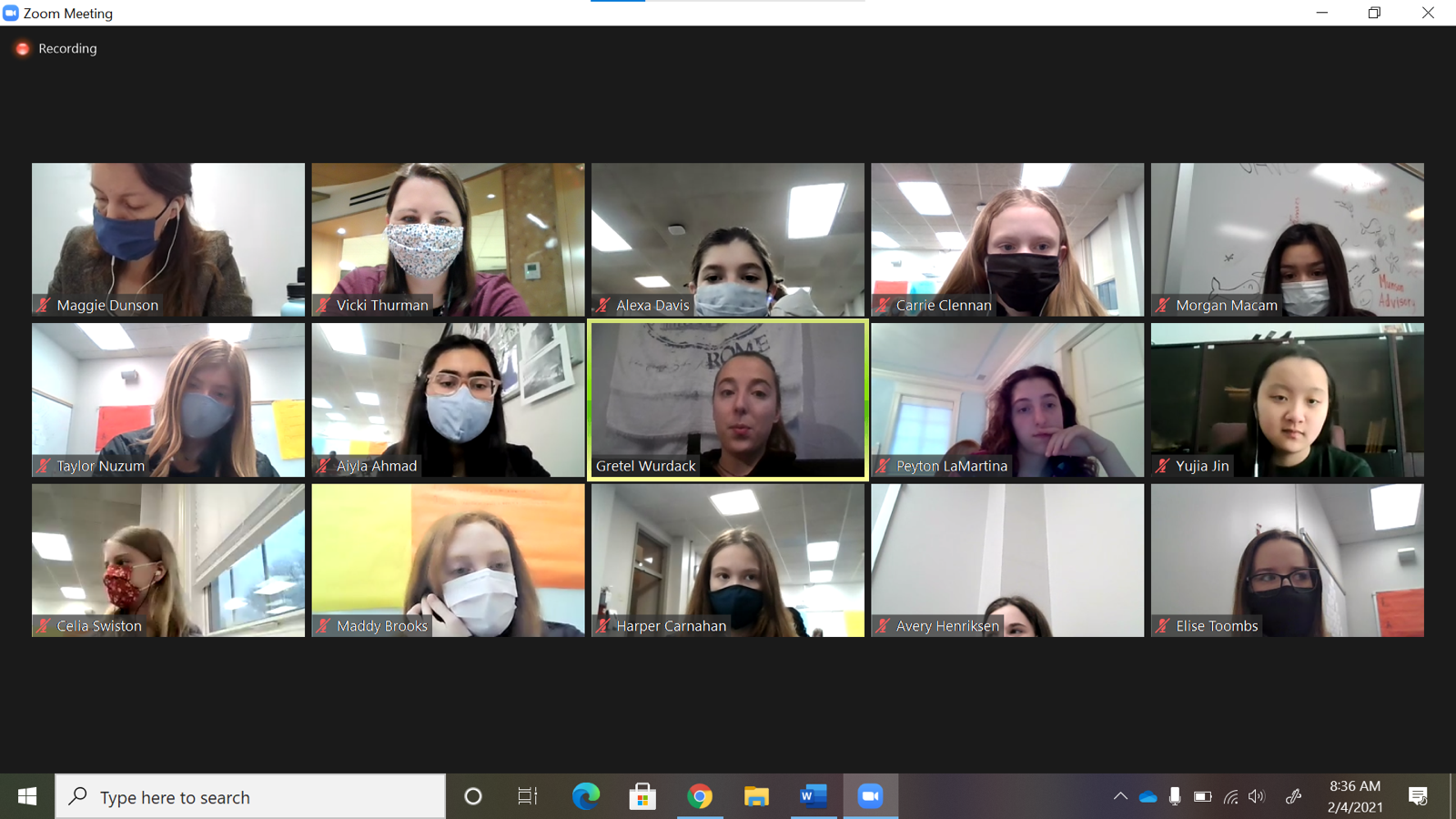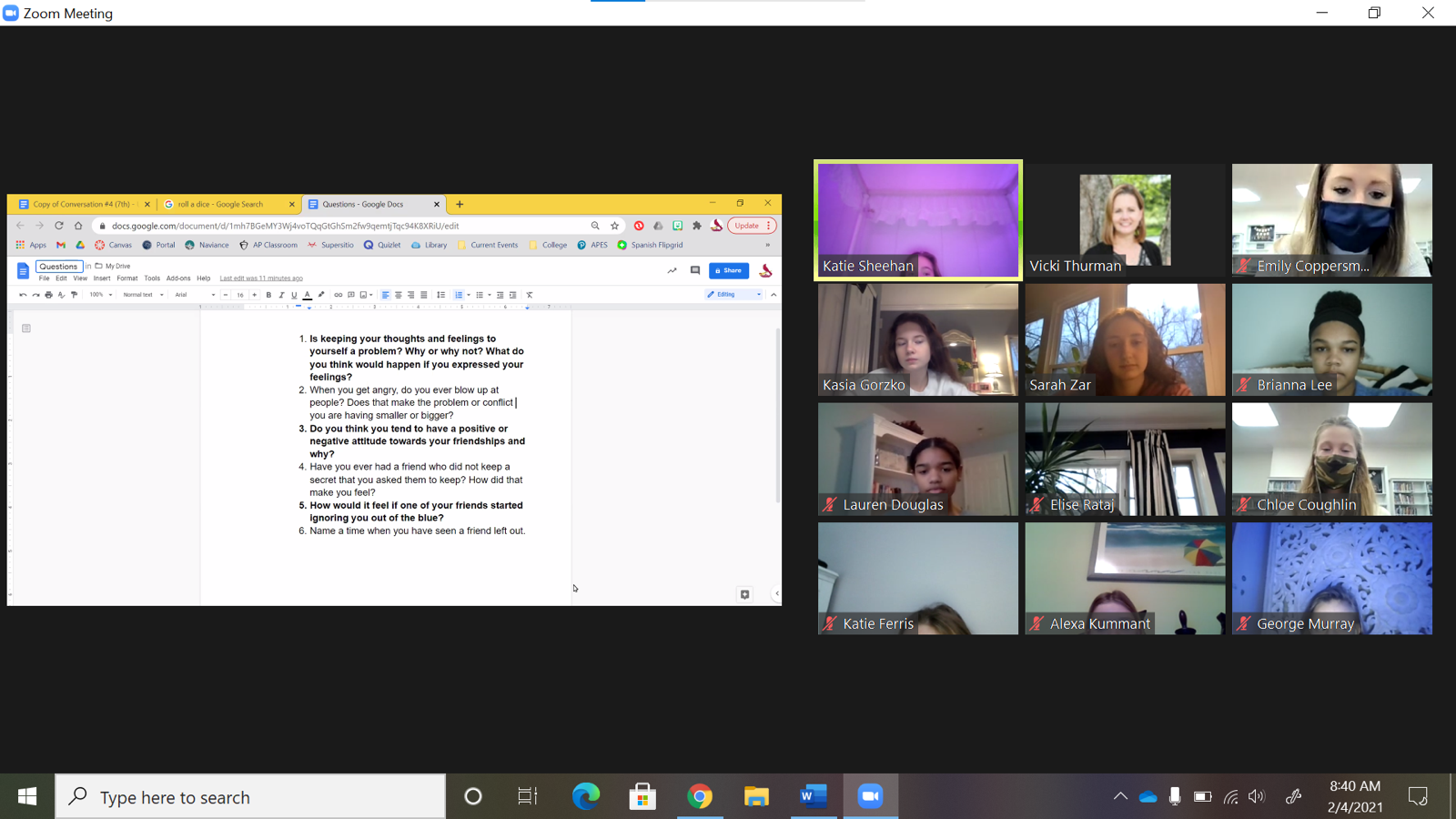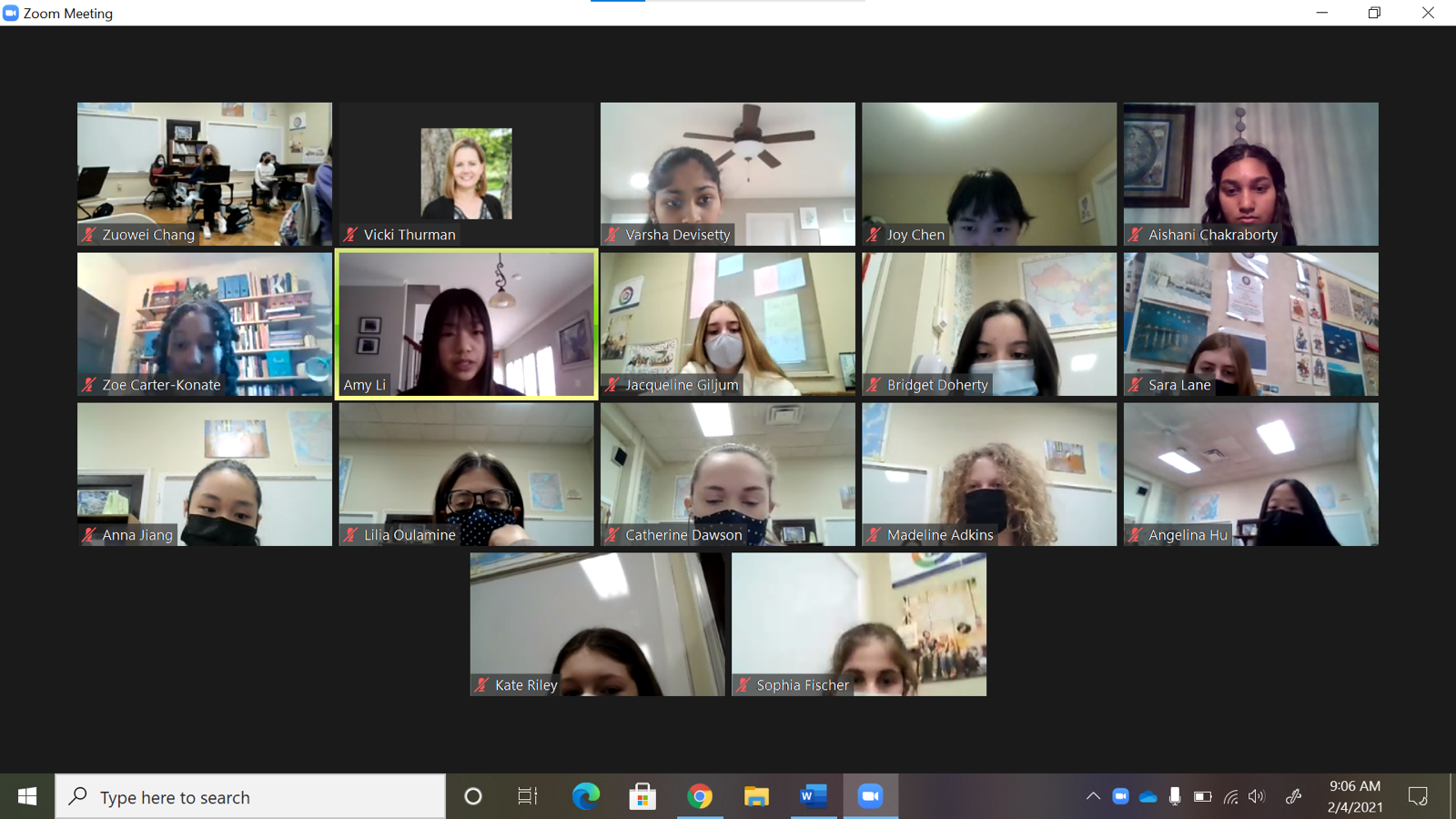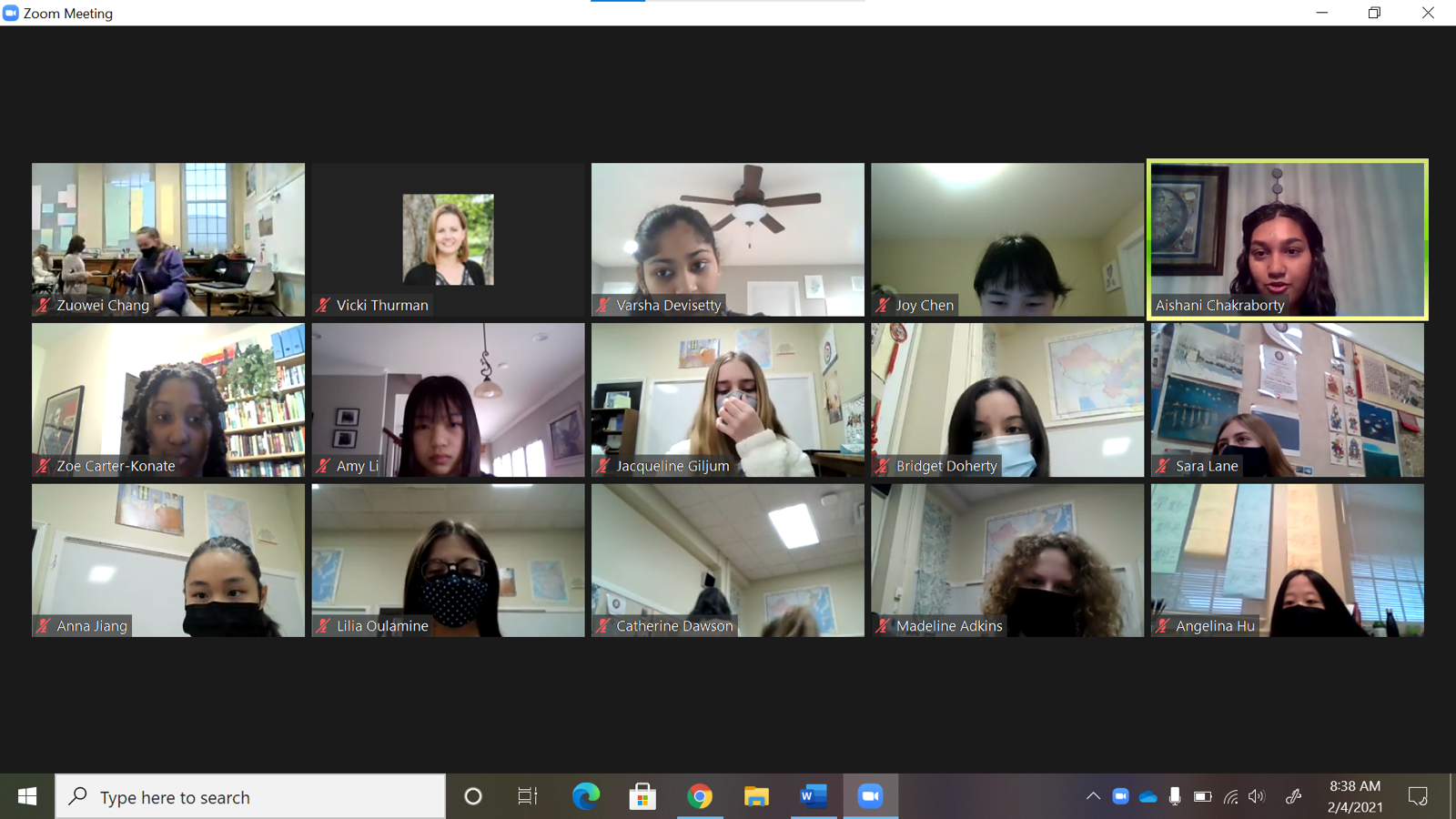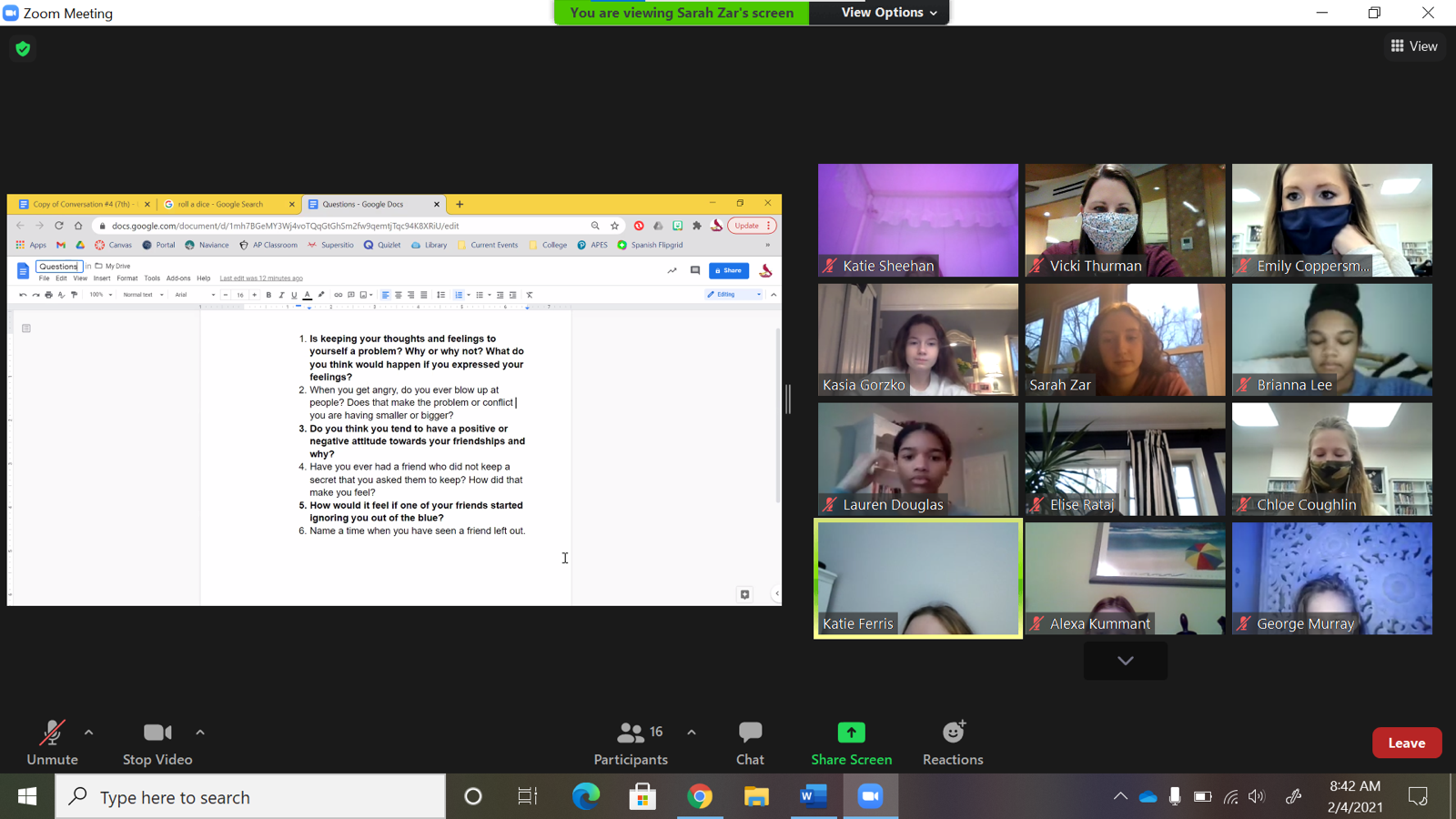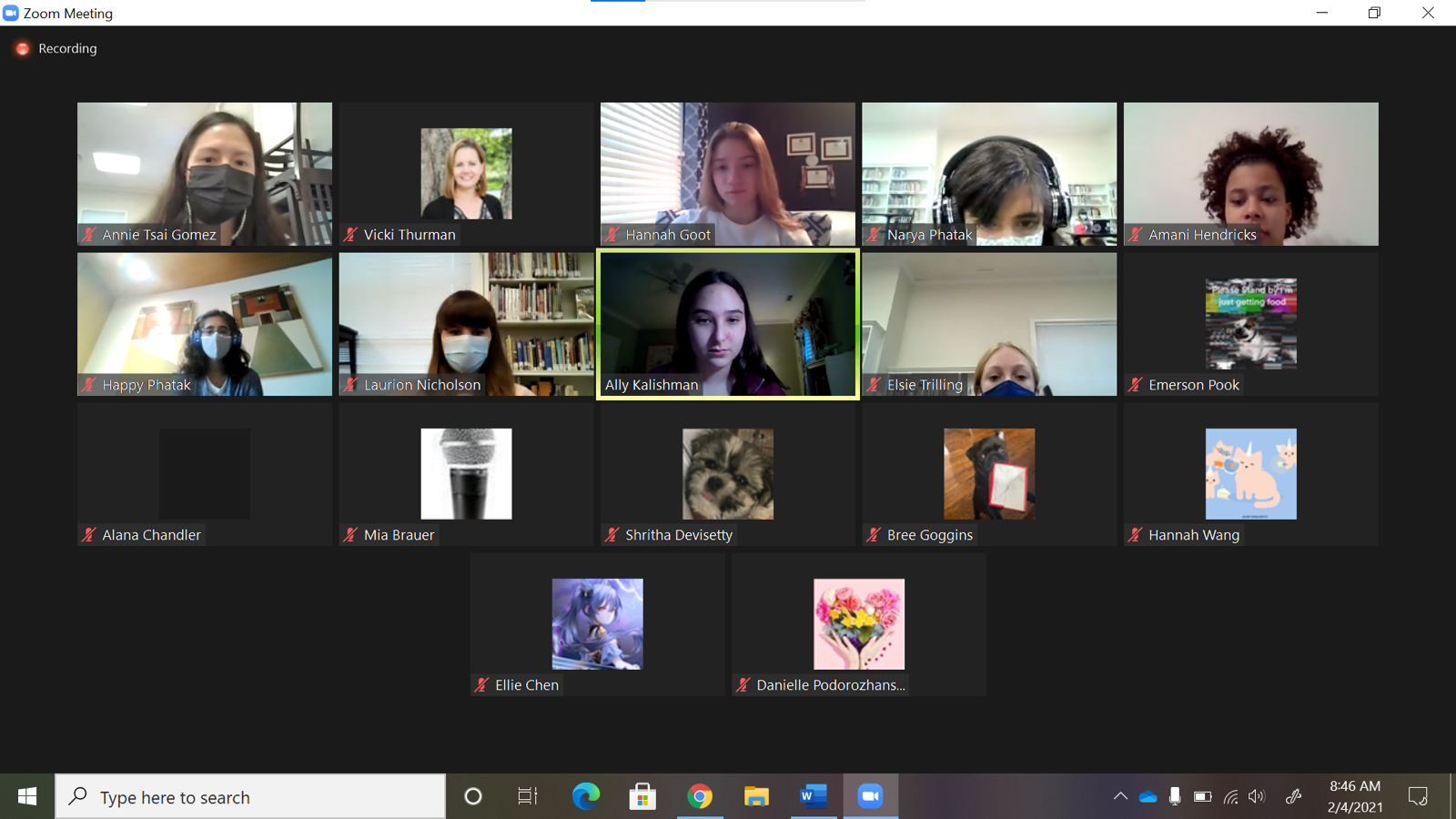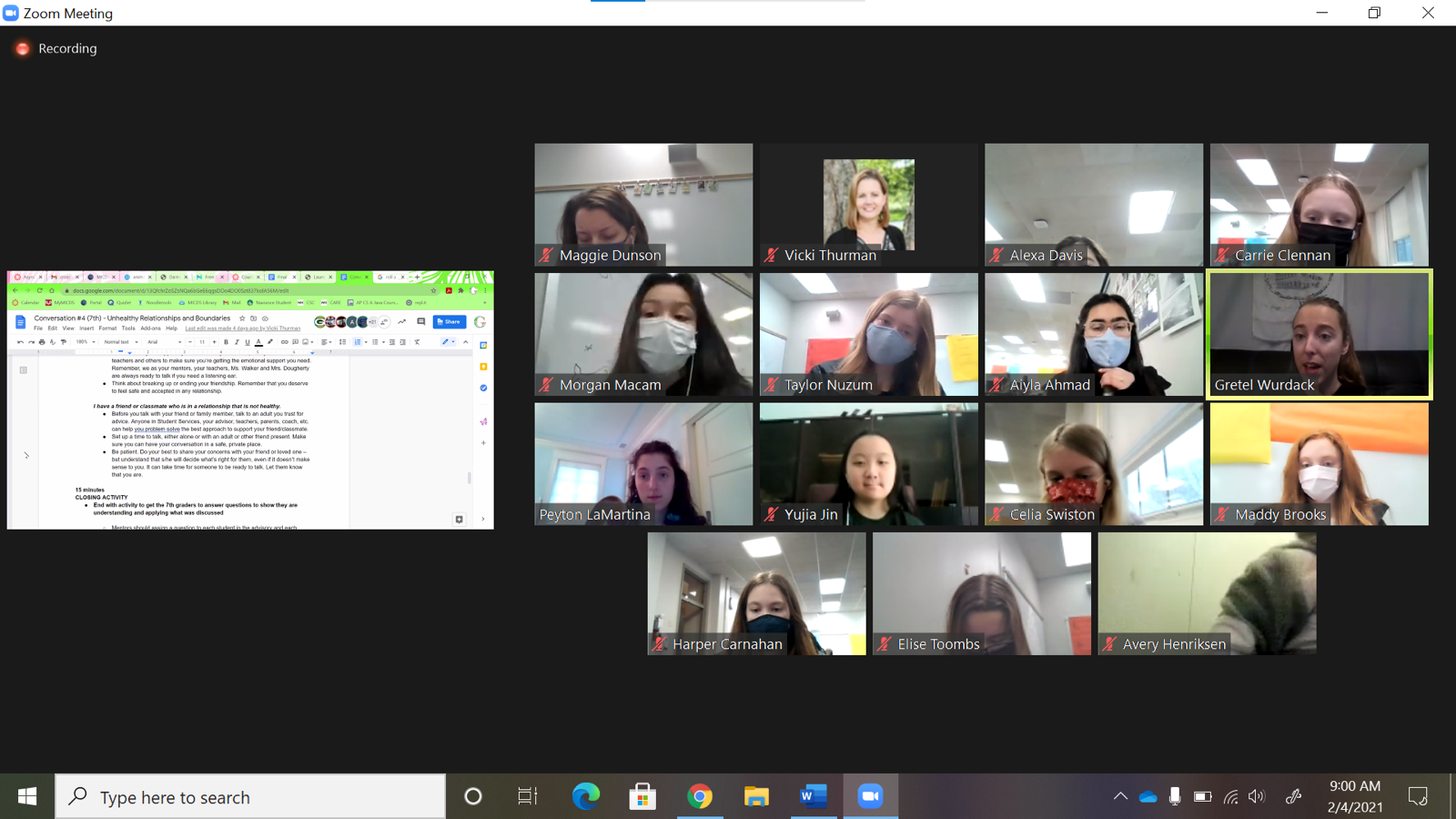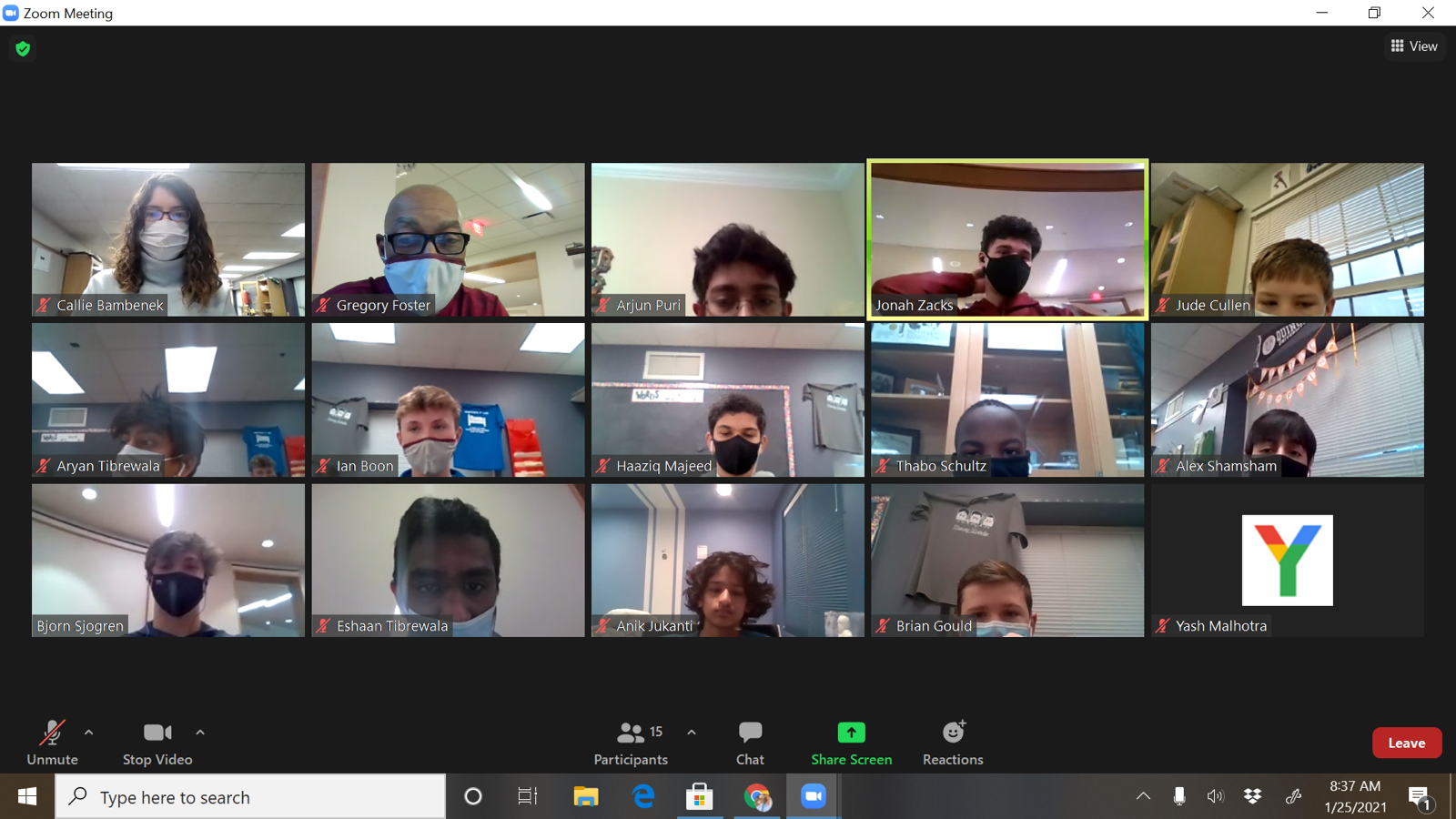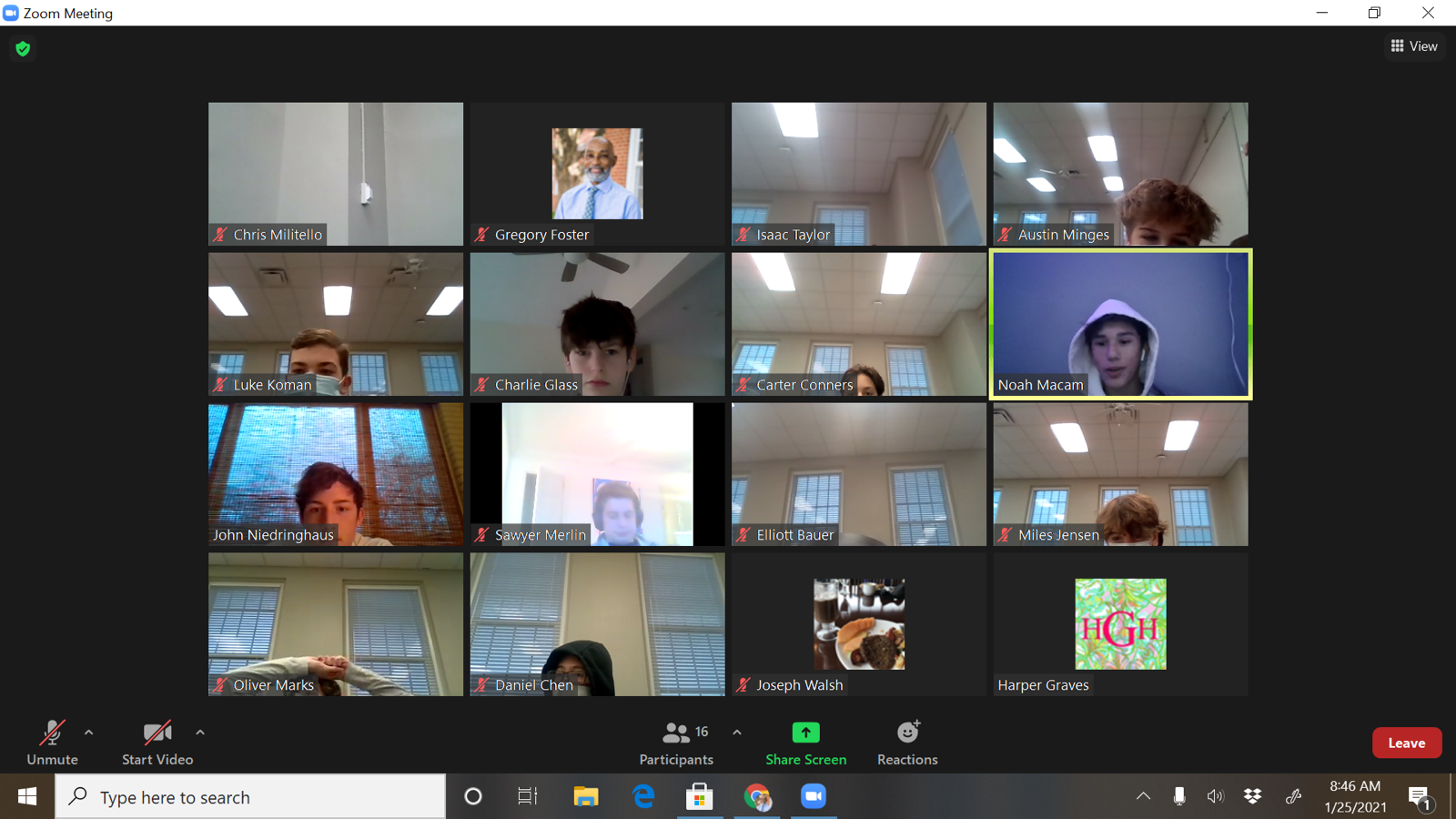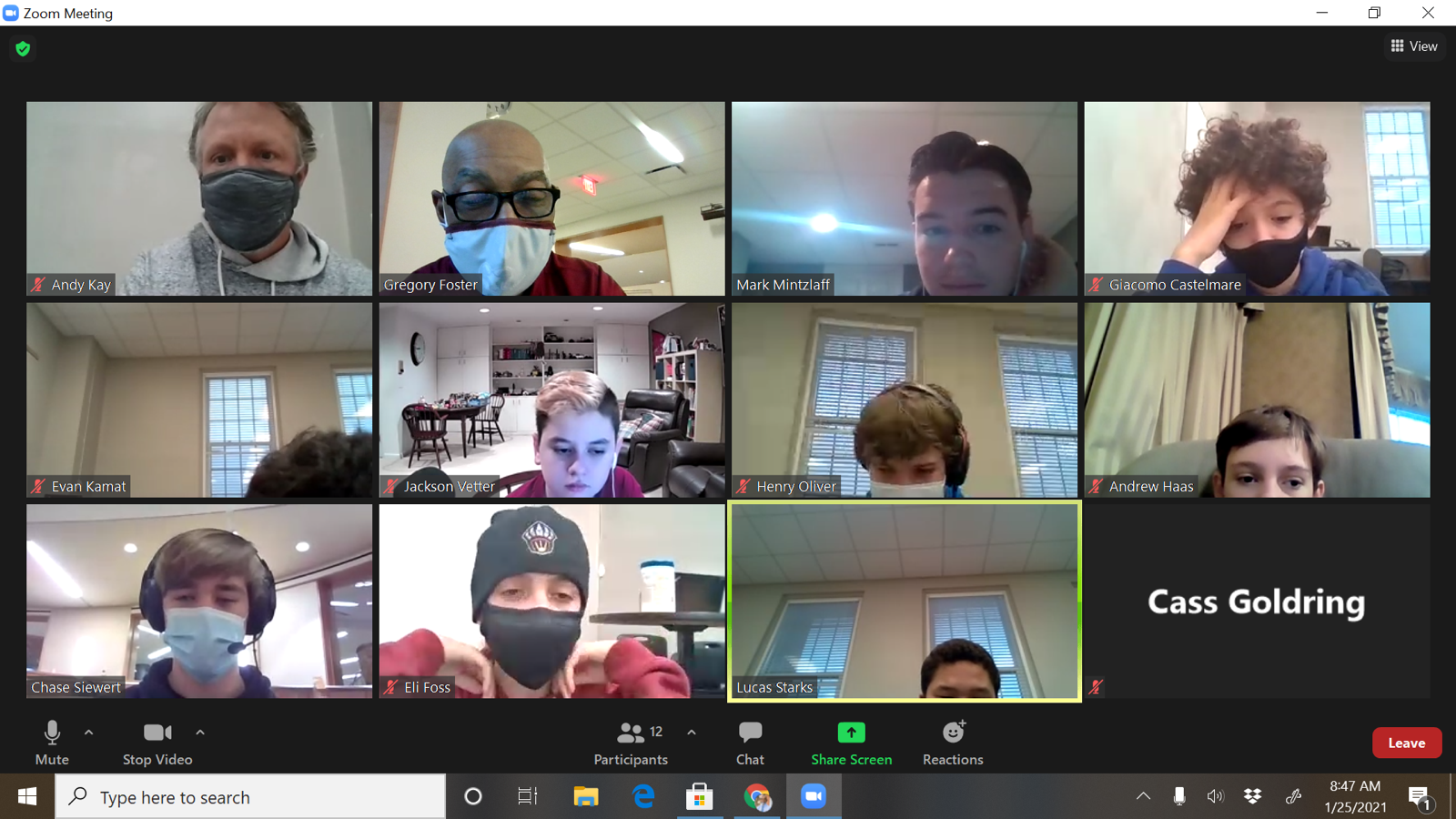In their last meeting with their Upper School peer mentors, 7th grade students learned about healthy relationships. This week, their work centered on the opposite: unhealthy relationships, how to identify them, and what to do.
Once again, our mentors set the tone for the session by sharing their own personal stories. Their willingness to be open and vulnerable with the younger students creates a safe space where everyone feels comfortable talking about difficult topics.
An interactive game inspired younger students to engage and connect with each other and their mentors. Using an online “roll the die” link, mentors assigned one of the following questions to a student on screen, making sure that each person had a turn to answer. All students participated, even mentors.
- Is keeping your thoughts and feelings to yourself a problem? Why or why not? What do you think would happen if you expressed your feelings?
- When you get angry, do you ever blow up at people? Does that make the problem or conflict you are having smaller or bigger?
- Do you think you tend to have a positive or negative attitude towards your friendships and why?
- Have you ever had a friend who did not keep a secret that you asked them to keep? How did that make you feel?
- How would it feel if one of your friends started ignoring you out of the blue?
- Name a time when you have seen a friend left out.
Communication Styles
What can students do when confronted with different communication styles? And how can they properly communicate themselves? First, it’s important to determine whether someone is communicating assertively or overly aggressively. Assertive communication is when someone stands up for themselves and expresses what they want and need clearly and in a way that still respects the other person. An example of this is, “I know you want me to do this, but I just can’t do it and I’m asking that you respect that.” It’s important to make eye contact and use an even confident tone. Mentors demonstrated overly aggressive behavior, giving examples of how communication can be pushy or forceful, or passive (“Yeah, whatever you want,” no eye contact, shuffling feet), or passive aggressive (eye rolling, “Just kidding,” “No offense, but…”).
Assertive Communication
Seventh grade students were encouraged to practice assertive communication through using “I” statements as a way of communicating feelings and needs directly and honestly without attacking the other person. They were given four steps to make an assertive “I” statement: I feel, because, I want or need, and I will.
I FEEL…
- Make an honest statement about how you are feeling, for example, “I feel hurt/upset/angry…”
- Make sure you are really stating your feelings, not a thought or belief about the other person. For example, “I feel you are totally selfish” is actually a “YOU” statement disguised as an “I” statement.
BECAUSE…
- Tell the person what action or behavior of theirs triggered your feelings. For example, “…because you went out with your other friends instead of going to the movies with me as we had planned, and you lied to me about why you were unable to go with me.”
- Be specific about why you feel that way and focus on the current situation rather than talking about the past (don’t say, “you always do this”).
I WANT OR NEED…
- Tell the person specifically what you want or need from them now or in the future when similar situations come up. For example, “I need you to spend time with me and keep our plans if we are going to be friends. If you’re going to cancel on me, I want to know at least a day in advance and I need you to be truthful with me.”
(Optional) I WILL…
- This step is optional. Hopefully the other person will communicate that they understand and will work with you on what you need after Step 3. However, if the problem continues, tell the other person what you are prepared to do to respond. For example, “I won’t make plans with you in the future if you cancel on me and are not truthful with me.”
- Don’t make threats. Think carefully about what you say in this step because if you threaten something and don’t follow through, you give that person the message that you don’t mean what you say and that your mind can be easily changed.
Signs of an Unhealthy Relationship
Advisories then brainstormed potential signs of an unhealthy relationship. Unhealthy relationships are often based on power and control, exhibit a lack of boundaries, are disrespectful, and contain poor communication.
Those based on power and control can include possessiveness, jealousy, someone who tries to limit who you can spend time with, and even threats. Lack of boundaries is exhibited through multiple (unwanted) calls and/or texts per day, friends who are clingy or pushy, yelling, or pushing and/or hitting, and losing temper with others. Disrespectfulness is shown through subtle verbal put-downs, both alone and with others, teasing, insults, and humiliation. Mentors were careful to talk about when teasing is good versus bad, and how students can tell when it crosses the line. Poor communication looks like a friend who will not listen to your ideas, is dismissive, twists your words, and is unpredictable.
What To Do
Perhaps some of the best advice came when mentors talked about what to do if you find yourself or a friend in an unhealthy relationship. First, it’s important to give yourself or your friend permission to lock out a friendship or end a relationship. At some point, everyone has conflicts and misunderstandings with others—even your closest friends. Trying to put your feelings into words when you’re scared or intimidated just makes the situation harder. It’s okay to communicate when you’re angry or are facing another difficult situation. While it’s not a guarantee that the other person will change their behavior, it can make you feel better by giving you some power in the situation, can improve your chance of being taken seriously, and can keep the situation from getting out of control. In each advisory, at least one mentor tried to share a personal story about a time that demonstrated a tough decision they had to make about a friendship.
There are a few things to keep in mind if you’re in a relationship that is not healthy. First, understand that a person can only change if they want to. You can’t force your friend to alter their behavior if they don’t believe they’re wrong. Focus on your own needs. Are you taking care of yourself? Your wellness is always important. Watch your stress levels, take time to be with healthy friends, and get enough sleep. If you find that your relationship is draining you, consider ending it. Connect with your support systems. Talk to your friends, family members, teachers and others to make sure you’re getting the emotional support you need. Mentors reminded 7th grade students that they are always ready to talk if they need a listening ear, and Ms. Walker and Ms. Dougherty are also available. Finally, think about breaking up or ending your friendship. Remember that you deserve to feel safe and accepted in any relationship.
Students can also help friends who are in unhealthy relationships. Before you talk with your friend or family member, talk to an adult you trust for advice. Anyone in Student Support Services, your advisor, teachers, parents, coach, etc. can help you problem-solve the best approach to support your friend/classmate. Set up a time to talk, either alone or with an adult or another friend present. Make sure you can have your conversation in a safe, private place. Be patient. Do your best to share your concerns with your friend or loved one, but understand that they will decide what’s right for them, even if it doesn’t make sense to you. It can take time for someone to be ready to talk. Let them know that you are.
Interactive Activity
The last activity engaged 7th grade students to answer questions that demonstrate they understood the information and can apply what was discussed. Students were assigned a question and could answer it or pass, or answer a different question if they had an example to share.
- How would it make you feel if one of your friends was always criticizing you? What would you do in this situation?
- What would you do if you have a friend who has a friendship with another person that is not healthy?
- Who would you talk to if you were trying to decide how to handle a difficult situation with a friend?
- Do you feel like you have a good support system of friends who you could go to if you need help with something?
- What would you do if one of your best friends accuses you of something you did not do? How would that make you feel?
- What is something you would like to do to improve your friendships?
- Tell us about a time when one of your close friends hurt your feelings? How did you feel? What did you do?
- Deciding to lock out a friendship can be really hard. When is it okay to decide not to be friends?
- Give an example of a time you had to lock out a friendship or decide not to be friends with someone any longer. Why did you make that decision? How did it go?
- Tell us about a time when a friend became jealous of your friendship with another friend. What did you do?
- Tell us about a time when you had a problem with a friend and that friend has gone to other friends to talk about it instead of coming directly to you. What did you do?
- Tell us about a time you had a friend who is nice to you 1:1 or in a very small group but does not include you or puts you down in front of larger groups. What did you do?
- Tell us about a time you have had a friend or friends who think it’s funny to tease you but sometimes they go too far and it makes you angry or upset. What did you do?
- You find out that someone you thought you were close to and call a good friend had a birthday party and did not invite you. This makes you feel excluded and confused because you thought you were close with this person.
As always, mentors stayed at the end in case their younger schoolmates had any questions or wanted to further explore any of these topics.
